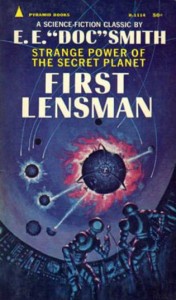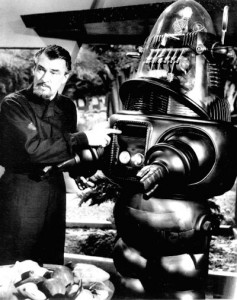2013
Apr
12
Mundane Science Fiction ... And Other BS
I imagine that many other science fiction fans welcomed the arrival of the 21st century as that harbinger of the long-awaited future's having at last arrived. The jubilation was, perhaps, tempered by the lack of what we have actually been able to accomplish: in 2001 there was was no giant double-ringed space station nor mission to Jupiter (or Saturn, depending on whether you are thinking of the film or the novel). What a lot of fans are not aware of, however, is that the early 21st century saw an insidious attack upon the very foundations of science fiction itself.
It's called mundane science fiction.
In a nutshell, it postulates that we would only write about near-future events with "known" science and no warp drive, time travel, aliens, or anything else really interesting. There is some theory involved that writing of such matters constitutes the tarnish of an adolescent fantasy about moving away from home. Knowing that I am unlikely to recall, for the purpose of this post, all of its malicious perfidy, I'll just copy the points from the ever-useful Wikipedia:
- That interstellar travel remains unlikely; that warp drives, worm holes, and other forms of faster-than-light travel are wish fulfillment fantasies rather than serious speculation about a possible future.
- That unfounded speculation about interstellar travel can lead to an illusion of a universe abundant with worlds as hospitable to life as this Earth. This is also viewed as unlikely.
- That this dream of abundance can encourage a wasteful attitude to the abundance that is here on Earth.
- That there is no evidence whatsoever of intelligences elsewhere in the universe. Although absence of evidence is not necessarily evidence of absence, it is considered unlikely that alien intelligences will overcome the physical constraints on interstellar travel any better than we can.
- That interstellar trade (and colonization, war, federations, etc.) is therefore highly unlikely.
- That communication with alien intelligences over such vast distances will be vexed by: the enormous time lag in exchange of messages and the likelihood of enormous and probably currently unimaginable differences between us and aliens.
- That there is no present evidence whatsoever that quantum uncertainty has any effect at the macro level and that therefore it is highly unlikely that there are whole alternative universes to be visited.
- That therefore our most likely future is on this planet and within this solar system, and that it is highly unlikely that intelligent life survives elsewhere in this solar system. Any contact with aliens is likely to be tenuous, and unprofitable.
- That the most likely future is one in which we only have ourselves and this planet
 It is worth noting, of course, that some of these claims are spurious or outright wrong. Sure, faster-than-light travel is unlikely ... now. Just as faster-than-sound travel was once considered impossible, as was traveling faster than 60 miles per hour. I'm sure that crossing the ocean was once considered impossible. You see, the people in those days, as now, had little idea what technological advances would come in the future.
It is worth noting, of course, that some of these claims are spurious or outright wrong. Sure, faster-than-light travel is unlikely ... now. Just as faster-than-sound travel was once considered impossible, as was traveling faster than 60 miles per hour. I'm sure that crossing the ocean was once considered impossible. You see, the people in those days, as now, had little idea what technological advances would come in the future.
And who's to say it's an illusion that there are other worlds hospitable to life? Large numbers of exoplanets have already been found, and many scientists, myself included, consider it highly unlikely that there isn't life on some of them somewhere. And the idea that there is "no present evidence whatsoever that quantum uncertainty has any effect at the macro level?" Well, it didn't take long to nip that pernicious rumor in the bud: http://www.livescience.com/27137-uncertainty-principle-measured-macro-scale.html.
But the pure evil of mundane science fiction lies not with its shaky premises, but on its philosophical foundation. Meditate for a moment, if you will, on the term, science fiction. When Geoff Ryman and others started the movement in 2002, perhaps for them the operative word was science. For most of us, I'm sure, the operative word is fiction. For the sake of argument, I've taken a few definitions from the Oxford English Dictionary, which we should agree is the authoritative resource on the language.
1.1 a.1.a The action of fashioning or imitating. (Obs.)
b.1.b Arbitrary invention.
c.1.c concr. That which is fashioned or framed; a device, a fabric.
2.2 Feigning, counterfeiting; deceit, dissimulation, pretence. Obs.
3. a.3.a The action of ‘feigning’ or inventing imaginary incidents, existences, states of things, etc., whether for the purpose of deception or otherwise.
b.3.b That which, or something that, is imaginatively invented; feigned existence, event, or state of things; invention as opposed to fact.
I like the part that says, "as opposed to fact." The whole point of fiction is that it isn't true.
 I've used a similar example to make another point in another post, but let's go that route again. We know we have the science and technology to put a base on the moon. What we don't have is the motivation and funding. So, nowadays, the idea of a moon base isn't fiction at all from a scientific point of view, it's fiction from an economic and political point of view. Since I am currently reading Oliver Twist, let's use that as an example. If we take the novel and relocate it from Victorian England to a moon base, it's suddenly science fiction, right?
I've used a similar example to make another point in another post, but let's go that route again. We know we have the science and technology to put a base on the moon. What we don't have is the motivation and funding. So, nowadays, the idea of a moon base isn't fiction at all from a scientific point of view, it's fiction from an economic and political point of view. Since I am currently reading Oliver Twist, let's use that as an example. If we take the novel and relocate it from Victorian England to a moon base, it's suddenly science fiction, right?
Wrong!
As I argued in that other post, merely putting something into a space setting doesn't make it science fiction. The fiction really has to be about science somehow to make it science fiction. On top of that, if the story isn't pushing the limits of knowledge, is it science fiction at all? According to the tenets of mundane science fiction, we should restrict our imaginations to what is known, or at least likely to follow from what is known. If you take the fiction out of the science, how is it science fiction? A locomotive is an interesting work of known technology, derived from known scientific research on thermodynamics, but Murder on the Orient Express is hardly science fiction. Stories involving communications satellites and space shuttles and space stations and x-ray telescopes are hardly science fiction anymore; they are part of our present world.
The whole idea of science fiction is to go beyond what we know.
I used a bit of foreshadowing above when I wrote, "restrict our imaginations." You might have noticed that science fiction writers have always been free to write about near-future events using short-term extrapolations of known science and technology. There has never been any restriction on that. Nor has there been any restriction regarding writing about the end of the universe, intergalactic federations, and interdimensional travel. But apparently some people think there should be, and they've made it into a "movement."
Science fiction and fantasy have always been at the vanguard of imagination. They have reached beyond current reality and posed questions that no one ever before has thought to ask. What will the first contact with aliens be like? Will we even be able to communicate? How can species with totally different psychologies even find points of cooperation? What is really inside a black hole? What impact will teleporters have on society? What will humans be like in a billion years? What are the limits of biological diversity in the universe? Can history actually be changed? Will going faster than light really send you back in time? Have aliens ever visited the earth before? What impact on society would switching minds cause?
Mundane science fiction has a simple answer for all these questions: don't ask!
 It is the Newspeak of speculative fiction, striving to eliminate that speculation, to put boundaries on the imagination, to blockade creativity. Potentially, it is the death agony of science fiction. There has been a lot of science fiction of the mundane variety, and given the quantity of sci-fi that I've read, I'm sure I've read some of it. But I don't remember it. There have been some films — Outland comes to mind — but even that was, well, rather mundane. What I remember are the stories that stretched my imagination, that went One Step Beyond, that reached to The Outer Limits, that encroached upon The Twilight Zone. It has never been the ordinary, the "realistic" ... the mundane. The unknown — not the known — is the very soul of science fiction. Take it out and you have nothing.
It is the Newspeak of speculative fiction, striving to eliminate that speculation, to put boundaries on the imagination, to blockade creativity. Potentially, it is the death agony of science fiction. There has been a lot of science fiction of the mundane variety, and given the quantity of sci-fi that I've read, I'm sure I've read some of it. But I don't remember it. There have been some films — Outland comes to mind — but even that was, well, rather mundane. What I remember are the stories that stretched my imagination, that went One Step Beyond, that reached to The Outer Limits, that encroached upon The Twilight Zone. It has never been the ordinary, the "realistic" ... the mundane. The unknown — not the known — is the very soul of science fiction. Take it out and you have nothing.
If you want to write about the near future using known, "reasonable" science, then by all means do so. Such is the nature of creativity. But to make it a "movement" and try to elevate some set of stories to an imagined philosophical plateau above the others, is in itself psychological science fiction that doesn't fit the definition of "mundane." It doesn't need a "movement" any more than space opera does, so don't make it one, and don't suggest that's what other people should write.
I know, I appended to the title, "... And Other BS." but, frankly, it seems that I've already covered quite enough BS for one post.















Comments
There are no comments for this post.
You must be logged in to post a comment.